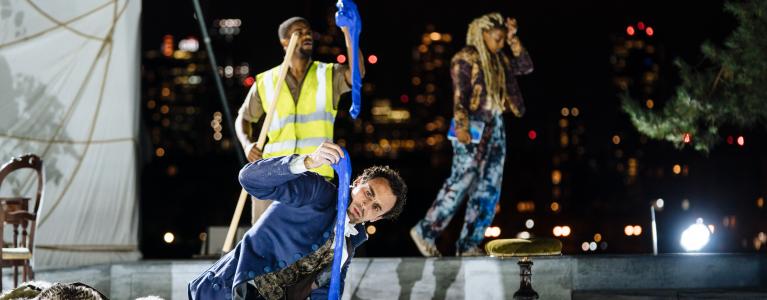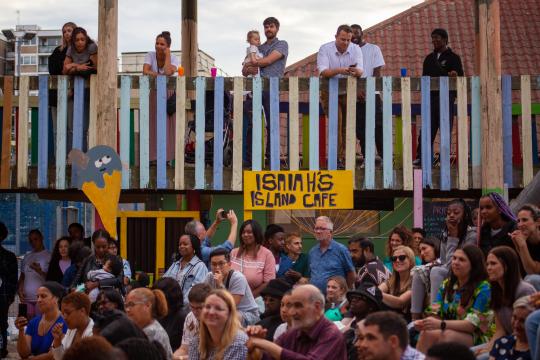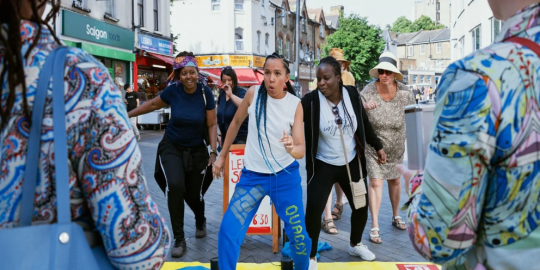
Some answers...
An opera set on a beach. A play in the arctic. Artworks highlighting air pollution. A venue for activism housed in a neglected adventure playground.
Lewisham have been speaking, rapping, singing and sketching to articulate their views on how air pollution, global warming and severe weather will affect the borough as part of their London Borough of Culture year. We spoke to creatives and producers about how they handled the subject.
Bring the arctic to the banks of the Thames
The Gretchen Question had three narrative themes including Victorian age of adventure, modern day influencers greenwashing the arctic and the near future; where the reality of a changing climate began to set in. Photo above taken by Helen Murray shows Alex Mugnaioni, Ryan Gerald and Tamaira Hesson in The Gretchen Question.
Climate action takes three forms: cutting emissions to limit impacts, adapting to the effects that cannot be avoided, and rebuilding in communities struck by impacts that cannot be adapted to.
The imagination and creativity required for all three does not emerge from stressed and divided societies. It emerges from safe places of collective confidence and fresh perspective, fuelled by a sense of wonder and curiosity.
Theatre’s role is to provide those spaces for people to come together (however briefly), and to offer moments of wonder, even awe, to catalyse human imagination and innovative thinking.
Plaster the council’s office with drawings
For Breathe 2022 Dryden Goodwin sat and drew six people from Lewisham as they breathed in and out to highlight the impact of air quality on people's lives in the borough. In 2013 Lewisham resident Ella Kissi-Debrah was the first person to have air pollution from the south circular road included on her death certificate, her mother Rosamund is amongst the figures drawn and pasted on Lewisham Town Hall.
Build the future climate movement out of haybales
The Richard MacVicar Adventure playground in Deptford was taken over by Sounds Like Chaos to build a place for the young people of Lewisham for activism. Built from the ground up by young people and for young people to develop as the creative leaders of tomorrow.
Theatre can help us understand the real human experiences of climate change. It is a place where the community can gather and share stories, ideas and fears in creative ways that are relatable and inclusive.
The Climate Home stage became a space where young people could lead the conversation, highlighting important issues for their local communities, grieving what can't be changed and offering new ideas and hopes for the future.

Sing about the Great Barrier Reef
In June, the stage at The Albany in Deptford was flooded with sand to create Sun & Sea (Marina), first seen at the Lithuanian pavilion of the Venice Biennale. Performers sing about the whitening of the Great Barrier Reef and rubbish-choked ocean as they rub suncream in, play badminton or read.
The climate crisis is the most urgent topic of our time and often seems too massive or daunting a subject for artists to take on. How can you transmit the enormity of the climate situation to audiences? How can you compel people to feel the climate crisis more deeply and address it with more urgency?
One group of artists chose to answer this by showing people doing barely anything at all. This summer, LIFT brought together London Borough of Culture, The Albany and Serpentine Galleries to present award-winning Lithuanian climate opera Sun & Sea. Dozens of performers lazed about on 16 tons of sand installed in The Albany. A chorus of volunteers, kids, and a dog joined them to sing songs about the banality of their holidays, about the plastic in the ocean. They lay in the sun, not doing much. Audiences moved around the balcony above the circular stage taking it all in, absorbing an atmosphere of heat, the sun, the beach, their laments, their inactions.
Watching them enjoy a simple day in the sun on the sand makes climate change and environmental degradation urgent. The message is hidden underneath the glorious spectacle of the show, in the wry comic beauty of the songs.
Audiences told us the experience of watching Sun & Sea was absorbing, shocking, compelling, mesmerising and beautiful. I think that's because while we're watching the performers have a day on the beach, we're also seeing ourselves enjoy a pastime that many climate scientists predict we're unlikely to enjoy in twenty, thirty years' time. That sense of impending loss makes the climate crisis instantly personal, immediate and something we all need to demand action on.
Build a street theatre revolution!
Teatro Vivo became agents of change embedding themselves in Lewisham Council, attending every single meeting of the environment team and taking to the streets in every ward in the borough with their usherettes, street characters designed to find out about concerns people had about the planet.
Theatre can galvanise peoples' anger. On the streets of Lewisham we spoke to or performed to around 5000 residents. All agreed something needed to be done about climate change, yet felt powerless to do anything themselves.
We made theatre that reflected the responses we'd found from people on the streets and in seeing that reflected it helped audiences to focus their attentions and energies on the best places to make change - how to get engaged locally, what things to push local government to do, what things to demand that national government and companies need to do.
Theatre joins us together for a collective moment where we can all feel and think together. This can challenge us or re-enforce our ideas, but at best it pushes us to a greater understanding of our own thinking and feelings. It's a moment to reflect. We can't give the answers, but we can give options and a place for emotional and intellectual reflection that can embolden people to get more involved.
